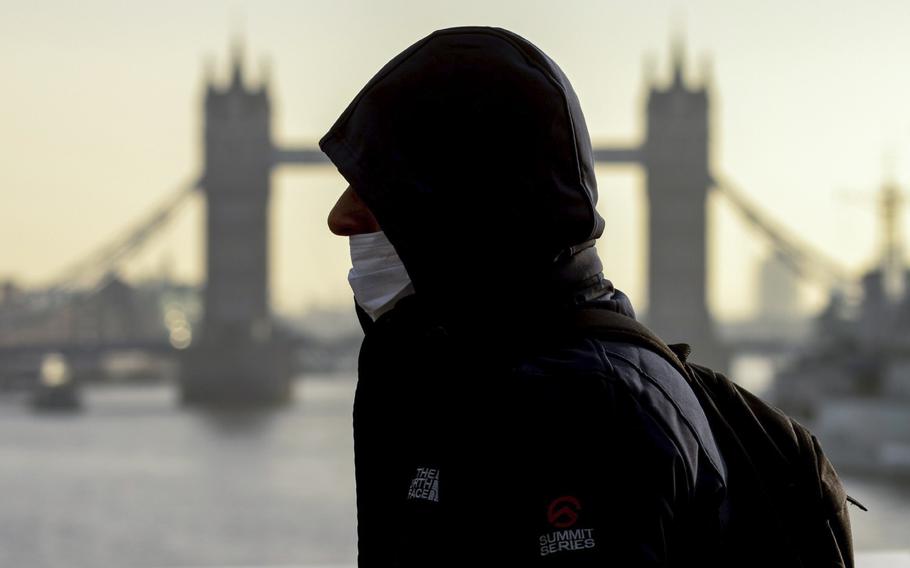
A commuter passes in view of Tower Bridge in London on Nov. 29, 2021. (Jason Alden/Bloomberg)
European leaders and scientists warned Friday that the omicron variant could become dominant in some countries startlingly soon, overtaking the delta variant, which has remained the most common version of the virus globally for months.
"We expect it to overtake delta within days, not weeks," Nicola Sturgeon, the first minister of Scotland, said Friday about the spread of omicron there.
That echoes the latest update from the U.K. Health Security Agency, which has high confidence that omicron has a growth advantage over delta and estimates that, spreading at its current rate, it will become dominant in Britain by mid-December, with more than a million infections by the end of the month.
In Denmark, too, omicron on its current trajectory could become dominant by "the end of next week," said Mads Albertsen, a professor at Aalborg University.
The sense is that Britain and Denmark aren't standouts. Rather, they are tracking and modeling the spread especially carefully, and what they're reporting may reflect what's emerging elsewhere in Europe. And since so often during the pandemic Europe has served as a preview of what's to come in the United States, U.S. officials are watching closely, as well.
Epidemiologists already know omicron has spread rapidly in South Africa - the earliest sample of the variant identified there was from the first week of November, and it was dominant within a month.
But South Africa had fairly low levels of the coronavirus when omicron emerged, meaning it didn't take much for the new variant to prevail. Also, only a quarter of people in South Africa have been fully vaccinated. Europe offers a truer test of whether omicron can beat out delta in places where the majority of people are vaccinated.
"The speed of it is surprising," said Linda Bauld, a professor at the University of Edinburgh. "If it can overcome delta in Scotland and the U.K., then it will do elsewhere."
Key questions remain open, including about the severity of illness it causes and the extent to which extent vaccines will continue to provide protection.
WHO Director General Tedros Adhanom Ghebreyesus warned against drawing "firm conclusions" at this point.
Anthony S. Fauci, America's top infectious-disease expert, said earlier this week that, based on preliminary data, the omicron variant may cause less severe illness than earlier variants of the virus.
But many countries in Europe aren't waiting to find out more. They have been reintroducing or adopting a range of control measures - from travel restrictions and mask requirements to limited lockdowns and vaccine mandates.
Some experts worry that even if the variant causes less severe illness, its rapid growth may overburden hospitals that were already strained by the continent's latest wave of delta cases.
"While hopeful, we are not certain any reduction [in the severity of illness] would be enough to keep the total number of hospitalizations from going up substantially - beyond our capacity to absorb them," Rowland Kao, a University of Edinburgh professor, told the Science Media Center.
Neil Ferguson, an epidemiologist at Imperial College London whose models have shaped government policy in Britain and the United States, told the Guardian that the omicron variant "could very substantially overwhelm the NHS, getting up to peak levels of admissions of 10,000 people per day."
Sturgeon warned of a "potential tsunami of infections" and urged Scots to defer their Christmas parties.
The suspected proportion of omicron among all coronavirus infections in Scotland surged from 2% Sunday to more than 15% Friday, suggesting that cases are doubling every two to three days.
"What we are seeing in the data just now is perhaps the fastest exponential growth that we have seen in this pandemic so far," Sturgeon said.
Albertson in Denmark said that new restrictions announced Wednesday - which include longer school vacations over Christmas and nightlife curbs - could delay, slightly, the point omicron surpasses delta there.
"It will come very fast in most countries now," he said.
Though Europe has gone much further than the United States in imposing new restrictions in recent weeks, European governments have sought to avoid measures as rigid or as wide-ranging as last winter.
Bauld, the University of Edinburgh professor, said restrictions are important to give more people time to receive their booster shots and to avoid hospitals being overwhelmed.
Despite uncertainty over how much omicron reduces vaccine effectiveness, Bauld said her advice remains unchanged: "Anybody who's had any vaccines is hugely better off than people who have had no vaccines."
- - -
The Washington Post's Joel Achenbach contributed to this report.